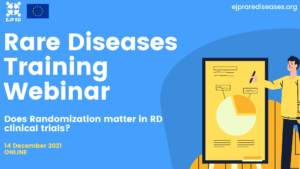- 14 December 2021 - 16:00
- Online
Rare Diseases (RD) is an area where national and international multidisciplinary collaborations are valuable to overcome some of the present challenges in research. Comparative trials serve as a major basis for evaluation of new therapies in RD patient care. Randomization as tool for treatment allocation in comparative trials and blinding are the accepted standard tools to enable a fair treatment comparison by mitigating bias. The unique challenges of RD clinical trials originate from the limited sample size and heterogeneity in the patient population, so that researchers may think about restricting or totally avoiding randomization. Recent findings underpin the view, that randomization in small populations clinical trials like in RD is different from classical clinical trials. Regardless of this difference in the value of randomization, in RD clinical trials, more attention should be payed to the selection of the best performing randomization procedure. This offers on the one hand improved mitigation of bias, and on the other hand the potential for an alternative basis for the inference.
Our main focus will be on randomization aspects in comparative clinical trials with a parallel group design, where no adaptation of the trial based on interim inspections is applied. Therefore, knowledge of common clinical trial terminology is essential to successfully follow the course. The course will teach the ideas and concepts and will try to avoid analytical derivations, if possible.
The aim of the lecture is:
- to learn about other randomization procedures beyond the most frequently applied permuted bock randomization in a fixed sample scenario,
- to understand properties of different randomization procedures beyond balancing sample sizes,
- to argue, which randomization procedure fits best in a particular trial setting,
- to know about the potential advantages of randomization from design to analysis of clinical trials in RD.
This training is an advanced level course.
This training is divided in two parts:
The first part of the webinar consists of a 1.5h training in less frequently applied randomization procedures and their performance on the level of evidence. We will learn about the need for randomization in RD clinical trials and learn about different attributes. Then different randomization procedures like complete randomization, Efron’s biased coin, Big Stick Design, Maximal Procedure, etc. will be introduced along with their properties. We will focus on regulatory needs implemented as a selection criterion and show how this can be used to understand the impact of bias on the level of evidence. The topics will be illustrated using examples.
Finally we will give some comments on extensions and implications of the acquired knowledge for other trial design settings.
In the second part of the webinar consists of one hour of panel discussion with known experts from different fields will be conducted to discuss various perspectives of the topic. This will include the regulatory, pharma-industrial, academic, and clinical perspective. In particular, questions from the audience will be answered while reflecting these different perspectives.
The training webinar is organized as a series of lectures presented by experts in the specific topics. Interaction between participants and lecturers will be facilitated by moderated question & answer sessions.
The workshop is open to the international research community, clinicians, medical specialists, healthcare professionals and advocacy patient groups with knowledge on the RD Clinical Trials.
Please click on the following link to register: https://forms.office.com/r/sWfUwigdti.
REGISTRATION DEADLINE: 10 December 2021.
The training and registration are free of charge. The training organisers will not cover expenses incurred by the participants in any way.
At the end of the training, participants will be requested to fill an online questionnaire as a feedback for learning and impact assessment.
A certificate of attendance will be given at the end to the participants who attended the entire workshop. No credits of Continuing Education in Medicine will be issued.
The language of the training webinar is English.
Online. Details for the connection will be provided in advance to confirmed participants.
EVENT INFO :
- Start Date:14 December 2021
- Start Time:16:00
- End Date:14 December 2021
- End Time:18:30
- Location:Online



